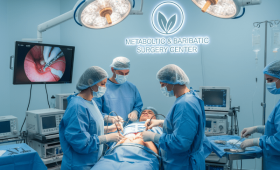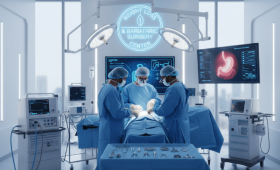What is the Average Cost of Gastric Bypass in Turkey?
The average costs for Gastric Bypass procedures in Turkey are significantly lower compared to prices in the United States or European countries. This pricing advantage stems from the lower general cost of living in Turkey and the attractive exchange rate difference for foreign patients. Prices vary according to the experience of the surgeon performing the operation, the international accreditation of the hospital where the surgery will be performed, and the scope of the package services offered (accommodation, transfers, interpretation). Since Bypass is a more complex procedure than Sleeve Gastrectomy, its cost may be slightly higher. For precise cost information, contacting Cure Holiday and sharing your detailed medical history will be the most accurate step.
What is Included in the Gastric Bypass Surgery Package?
Comprehensive Gastric Bypass surgery packages are designed to facilitate the patient’s entire journey, from arrival in Turkey to discharge. These packages cover not only the surgical procedure and anesthesia fees but also all compulsory blood and radiology tests required before the operation (ECG, chest X-ray, endoscopy), accommodation costs during the hospital stay (usually 3 nights), initial post-operative medications and vitamin supplements, necessary cardiology and internal medicine consultations, and dietitian support. Furthermore, comfortable VIP transfer services between the airport and the hospital are a standard part of the package, ensuring the patient can focus solely on their recovery.
Why is Turkey Preferred for Gastric Bypass?
Turkey owes its status as a primary choice for Gastric Bypass surgery to its ability to combine high quality standards with economic costs. Most Turkish hospitals are equipped with state-of-the-art technology and possess international quality accreditations (such as JCI). Due to high demand and the number of operations performed, surgeons in this field have gained worldwide experience, successfully applying complex Bypass procedures. The most significant factor is the exchange rate advantage, allowing foreign patients to receive high-quality service at a cost far below prices in the West. This situation creates a substantial financial incentive for patients.
What is the Minimum Length of Stay Required in Turkey for Surgery?
To ensure a safe and controlled recovery period after Gastric Bypass surgery, the minimum length of stay in Turkey is generally set at 7 to 10 days. This duration is important because the surgery, by its nature, requires a more complex recovery process. After spending 3-4 days in the hospital, this period allows you to spend the first critical recovery phase resting at a hotel, complete important follow-up checks with your surgeon, and ensure sufficient wound healing. This monitored recovery time is crucial for the swift management of any potential early complications and for the patient to receive full clearance for long-haul air travel.
Are Accommodation and Transfer Services Included in the Package?
The vast majority of Gastric Bypass packages prepared for international patients include accommodation and transfer services to make the patient’s process in Turkey comfortable and stress-free. These services encompass VIP vehicle airport transfers, all transportation between the hospital and the hotel, and a specified period of stay at a high-standard hotel suitable for your post-discharge recovery (generally included in the 7-10 day total stay). This logistical support allows patients to focus entirely on their recovery without worrying about transportation or accommodation in a foreign city. All details are meticulously planned by Cure Holiday.
Is the Surgery Performed Using the Laparoscopic Method?
Yes, the majority of Gastric Bypass procedures in Turkey are performed using the modern laparoscopic method (keyhole surgery), which ensures patient comfort and rapid recovery. Although Bypass is anatomically more complex, this technique involves making small incisions on the abdomen to insert surgical instruments, rather than a large single cut. The laparoscopic method is preferred because it results in less pain, less blood loss, a shorter hospital stay, and much smaller, more cosmetically acceptable scars. This is also the gold standard method that reduces the risk of clotting.
How Does Cure Holiday Provide Support Throughout the Process?
Cure Holiday is designed to provide you with comprehensive end-to-end support at every stage of your Gastric Bypass journey. This support ranges from providing a personalized treatment plan and price quote during the initial free consultation to selecting the most suitable and experienced surgeon and hospital for your operation. Furthermore, it includes all travel arrangements (VIP transfers, hotel accommodation) and 24/7 accessible interpretation services to ensure you do not experience a language barrier throughout the process. Planning your post-operative remote follow-up appointments is also a critical part of this support.

What is the Ideal Body Mass Index (BMI) for Gastric Bypass?
Body Mass Index (BMI) is the main criterion for being a candidate for Gastric Bypass surgery, and individuals with a BMI of 40 or higher are generally the ideal candidates. However, since Bypass is more effective than Sleeve Gastrectomy for patients with metabolic comorbidities like Type 2 diabetes and severe reflux, people with a BMI between 35 and 40 who have serious chronic conditions related to obesity are also considered eligible. Even patients with Type 2 diabetes whose BMI is between 30-35 and whose condition cannot be controlled despite lifestyle changes may be recommended Bypass based on individual medical evaluation due to its metabolic effect.
What Kind of Evaluation Process is Applied Before Surgery?
The pre-operative evaluation process is multi-staged to ensure the reliability of the surgical decision and to understand if the patient is in a high-risk group. This process includes detailed laboratory tests, imaging such as ECG and chest X-rays, and examinations by cardiologists, internal medicine doctors, and anesthesiologists. Furthermore, psychologist and dietitian consultations are mandatory to assess whether the patient is prepared for the post-operative nutrition plan and psychological change. This comprehensive screening guarantees that the patient is fully ready for the demanding lifestyle change required by Bypass surgery, both physically and mentally.
What are the Age Limits for Gastric Bypass?
The lower age limit for Gastric Bypass surgery is generally accepted as 18 years, as the individual must have completed their growth and development. The upper age limit is flexible, depending not on a strict rule but on the patient’s general health status, control of chronic diseases, and the acceptability of the anesthesia risk. Since Bypass is a more complex surgery, elderly patients (over 65) undergo a more rigorous cardiac and internal medicine approval process. What matters most is the body’s biological health and whether the benefits of the surgery outweigh the risks.
Must Smoking and Alcohol Be Quit Before Surgery?
The absolute cessation of smoking and alcohol before surgery is critically important. Since Gastric Bypass carries the risk of ulcer (marginal ulcer) development at the surgical connection point (anastomosis), the vasoconstrictive effect of smoking significantly increases this risk. Surgeons mandate that smoking be stopped entirely at least 4 to 6 weeks before the operation, as smoking delays wound healing, increases the risk of infection, and raises anesthesia complications. Alcohol should also not be consumed for a similar period due to the burden it places on the liver; adherence to these restrictions is essential for maximizing surgical safety.
Is a Special Liver Diet Required Before Surgery?
Prior to Gastric Bypass surgery, the vast majority of patients are absolutely required to follow a special protein-rich, low-calorie pre-operative diet. The main goal of this diet is to make the surgery safer. It promotes rapid weight loss, which shrinks and softens the liver; this gives the surgeon a better field of vision around the stomach and at the small intestine connection points, reducing surgical risk. As Bypass is anatomically more complex, adherence to this diet is critical for the success of the operation. The duration of the diet is determined by the patient’s initial BMI.
How Does Weight Loss Before Surgery Affect the Success of the Operation?
Weight loss achieved under the supervision of a surgeon and dietitian before the operation positively affects the safety and long-term success of the surgical procedure. The weight lost with the pre-operative diet shrinks the liver, allowing the surgeon to work more safely around the stomach and at the intestinal connection points, which shortens the operating time and lowers the risk of complications. Furthermore, it is a strong signal demonstrating the patient’s commitment to and psychological readiness for the post-operative nutrition and discipline rules.
What Medical Tests and Imaging Are Mandatory Before Surgery?
A comprehensive series of medical tests and imaging are mandatory before Gastric Bypass surgery to fully determine the patient’s suitability for the procedure. These typically include a full blood count and biochemistry panel, liver and kidney function tests, detailed clotting tests, ECG, chest X-ray, and Upper Gastrointestinal Endoscopy. Endoscopy is vital for checking for ulcers, Helicobacter Pylori infection, or anatomical abnormalities in the stomach or duodenum before the operation.
What Are the Potential Risks of Obesity Surgery?
As with any major surgical intervention, Gastric Bypass carries potential risks. The most serious and vital risks include leakage from the stomach staple line, bleeding, wound infection, and anesthesia-related complications. More serious risks specific to Bypass are marginal ulcers and the long-term formation of internal hernias. Experienced surgeons and fully equipped hospitals minimize these risks by applying strict safety protocols, maximizing patient safety. Avoiding smoking and NSAID use is the most important individual step in risk management.
How is the Risk of Clotting (Thrombosis) Reduced After Surgery?
The risk of clotting (Deep Vein Thrombosis – DVT) is high in Gastric Bypass patients due to immobility and obesity-related circulatory issues. This risk is minimized by measures applied before and after surgery. These measures include the regular administration of blood thinner injections during the hospital stay, the use of special stockings to support blood circulation in the legs, and encouraging the patient to walk as soon as possible. Early mobilization is the most effective method for reducing the risk of blood clots, and adherence to these instructions is vital after complex surgeries like Bypass.
How is Post-Operative Pain Management Performed for Bypass Patients?
Post-operative pain is less intense than in open surgery because the laparoscopic incisions are small, but it is present in the first 24-48 hours. During the hospital stay, pain is managed continuously with strong intravenous painkillers and pumps. As Bypass involves more internal surgery, initial pain management is critically important. In the post-discharge period, oral painkillers prescribed by the surgeon should be used regularly. Effective pain management encourages the patient to mobilize early, walk, and perform breathing exercises, which significantly accelerates the recovery process.
Which Nutritional Stages Are Followed During the Bypass Recovery Process?
Post-operative nutrition after Gastric Bypass is a gradual process that must be strictly adhered to, allowing the stomach to heal and the new anatomical path to adapt. Generally, 4 main phases are followed: Clear Liquids in the first week (water, sugar-free compote), Full Liquids in the second week (protein shakes, yogurt), Pureed Foods in the third and fourth weeks, and Soft Solid Foods beginning in the fifth week. Each stage is determined by the dietitian to prevent Dumping Syndrome and minimize the risk of complications; the duration and content of these stages are subject to stricter rules than those for Sleeve Gastrectomy.
How is Gastric Bypass Surgery Performed and How Does It Differ from Sleeve Gastrectomy?
Gastric Bypass surgery is a complex procedure that creates both a restrictive and a malabsorptive effect. It differs from Sleeve Gastrectomy because it not only involves reducing the stomach size but also rerouting the small intestine. A small pouch (approximately 30-50 ml volume) is created from the upper part of the stomach (restriction). Then, the small intestine is cut and connected to this small pouch, allowing food to bypass a significant portion of the small intestine (malabsorption). This anatomical change increases the feeling of satiety and reduces nutrient absorption.

Which Patients is Gastric Bypass Most Suitable For?
Gastric Bypass is considered the most suitable surgical method, especially for patients with very high BMI (45+), uncontrolled Type 2 Diabetes, or severe gastroesophageal reflux (GERD) complaints. Due to its powerful malabsorptive and hormonal effects, the likelihood of Type 2 Diabetes going into remission is higher than with Sleeve Gastrectomy. Additionally, because Bypass almost completely resolves reflux symptoms, it is often the first choice for patients with reflux problems.
How Does the Malabsorptive Effect of Gastric Bypass Work?
The malabsorptive effect of Gastric Bypass occurs when food bypasses the first segments of the small intestine (the duodenum and part of the jejunum) and reaches the lower segment directly. These initial segments are where essential nutrients like iron, calcium, and B12 are absorbed. Bypassing these areas reduces calorie and nutrient absorption and promotes weight loss. However, this necessitates that the patient takes high-dose and diverse vitamin supplements lifelong, as severe deficiencies can otherwise arise.
What is Dumping Syndrome After Gastric Bypass and How is it Managed?
“Dumping Syndrome” is a condition that can occur in some patients after Gastric Bypass. It is triggered by the rapid passage of sugary or fatty foods from the small stomach pouch into the small intestine. Symptoms include palpitations, sweating, diarrhea, nausea, and dizziness. Management is simple: it is strictly necessary to avoid sugary, highly processed foods and high-fat foods. Eating slowly, separating solids and liquids, and consuming small portions are the most effective ways to prevent this syndrome. Dumping also acts as a deterrent, encouraging patients to avoid unhealthy foods.
How Does Gastric Bypass Surgery Resolve Reflux Complaints?
Gastric Bypass is often the best treatment option for patients with severe reflux complaints and permanently resolves reflux. This is because the surgery creates two main mechanisms that prevent stomach acid from escaping back into the esophagus, which is the cause of reflux. Firstly, only a small amount of food fits into the newly created small stomach pouch. Secondly, because the food flow from the stomach is redirected to the lower parts of the small intestine, the likelihood of acid secretion escaping back into the esophagus is greatly reduced or completely eliminated.
Which Vitamin Supplements are Vital After Gastric Bypass?
Due to the malabsorptive effect of Gastric Bypass, much more comprehensive and lifelong supplementation is vital compared to Sleeve Gastrectomy. The nutrients whose absorption is most affected in the small intestine are: Vitamin B12 (often in injectable form or high oral dose due to the bypassed intestinal route), Iron (especially in menstruating women, risk of anemia is high), Calcium, and Vitamin D. Zinc and Folic Acid are also important. Taking these supplements regularly and often in higher doses than standard prevents serious long-term complications like anemia and osteoporosis.
Does Gastric Bypass Surgery Increase the Risk of Stomach Ulcers?
After Gastric Bypass surgery, there is a risk of ulcer (marginal ulcer) development, particularly at the surgical connection point (anastomosis). This risk is increased in patients who continue to smoke after surgery, regularly use NSAIDs (non-steroidal anti-inflammatory painkillers), or have an H. Pylori infection. To manage this risk, surgeons usually prescribe stomach protective medications (PPIs) for a long period (sometimes lifelong) after the operation. Strictly avoiding smoking and NSAIDs and having regular check-ups are the most important steps in minimizing the risk of ulcers.
How Reversible is Gastric Bypass Surgery?
Gastric Bypass surgery is considered theoretically more reversible than Sleeve Gastrectomy, but this is rarely performed and is technically quite complex. During the Bypass procedure, the stomach is not removed; only a small pouch is created, and the intestines are rerouted. Therefore, in critical situations such as severe nutritional deficiencies or life-threatening rare complications, the old stomach and intestinal line can be surgically reconnected. However, this is also a complex revision surgery and is generally considered a last resort option with significant risks.
What is the Size of the New Stomach Pouch Created in Gastric Bypass?
The new stomach pouch created from the upper part of the stomach in Gastric Bypass surgery is quite small. The volume of this pouch is usually around 30 to 50 millilitres, which is roughly the size of an egg. This extremely small volume causes the patient to feel fullness with just a few bites, forming the restrictive effect of the Bypass. The small size of the pouch facilitates the patient’s post-operative portion control and contributes to rapid weight loss. Preventing the pouch from enlarging over time by avoiding excessively forced portions is vitally important.
Why is Gastric Bypass More Effective on Metabolic Diseases?
Gastric Bypass involves not only volume restriction but also an anatomical change that allows nutrients to reach the lower parts of the small intestine faster. This causes the early and powerful release of hormones from the intestines that provide a feeling of satiety and improve insulin secretion (like GLP-1). This hormonal and metabolic effect is critically important for the resolution of Type 2 Diabetes, which is why Bypass is known as a method that yields stronger and faster results than Sleeve Gastrectomy in the treatment of diabetes. Many diabetic patients can stop their insulin needs immediately after surgery.
Does Tolerance to Alcohol Change After Gastric Bypass?
Yes, tolerance to alcohol changes significantly and permanently after Gastric Bypass surgery. Due to the reduced size of the stomach and the direct routing of alcohol to the small intestine, alcohol enters the bloodstream much faster and in higher concentrations. This can cause patients to become quickly intoxicated with much smaller amounts of alcohol and may increase the risk of alcohol dependence. Alcohol consumption after surgery should either be completely stopped or strictly limited, as this is important for both liver health and the success of weight loss.
What is the Long-Term Complication Rate of Gastric Bypass?
Although Gastric Bypass offers stronger and more lasting weight loss than Sleeve Gastrectomy, the risk of long-term complications is also slightly higher due to the anatomical changes. Long-term complications include nutritional deficiencies (due to impaired absorption at the bypass site), marginal ulcers (at the surgical connection point), internal hernias (resulting from intestinal rearrangement), and Dumping Syndrome. Regular and lifelong medical follow-up and vitamin supplementation are the only ways to manage and prevent these long-term risks, thereby maintaining the patient’s quality of life.
Why is Long-Term Follow-up After Gastric Bypass Critically Important?
Long-term follow-up after Gastric Bypass is vital for the patient’s health. Due to the malabsorptive effect, patients may experience permanent deficiencies in essential nutrients like Vitamin D, Calcium, B12, and Iron. Long-term follow-up enables these deficiencies to be monitored with annual blood tests, the adjustment of supplement doses, and the prevention of serious consequences (anemia, osteoporosis). Furthermore, problems like weight regain or potential ulcer development can be detected early and intervened upon promptly. This diligence is essential for long-lasting and healthy outcomes.
What Are the Advantages and Disadvantages of Gastric Bypass?
The biggest advantages of Gastric Bypass are that it provides the highest rate of Type 2 Diabetes remission, permanently resolves severe reflux, and generally results in higher excess weight loss than Sleeve Gastrectomy. The disadvantages are that it is surgically more complex and time-consuming, anatomically harder to reverse, carries a high risk of long-term nutritional deficiency, and poses a risk of ulcer development at the surgical connection site. Therefore, Bypass is often recommended as the first choice for patients with accompanying diseases (diabetes and reflux) that cannot be controlled with other methods.
In Which Cases is Roux-En-Y Gastric Bypass Preferred Over Other Bypass Types?
Roux-en-Y Gastric Bypass (RYGB) is the most commonly performed type of Bypass worldwide. It is generally the first-choice method for patients with Morbid Obesity (BMI 40+), uncontrolled Type 2 Diabetes, and severe reflux complaints. The main reasons for preferring it over other bypass types (such as Mini Gastric Bypass) are its proven efficacy in resolving reflux, better long-term tolerability, and lower risk of bile reflux compared to other bypass types. This makes it the most reliable method with the most established standard follow-up.
When Can Normal Solid Foods Be Resumed After Bypass?
Resuming normal solid foods fully generally occurs 6 to 8 weeks after the operation, after receiving full clearance from the surgeon and dietitian. This duration is required for the stomach pouch staple line to heal completely, for the new intestinal connections to stabilize, and for the patient to learn to manage Dumping Syndrome. Even when returning to solid foods, patients must remember to consume smaller portion sizes and chew every bite slowly and thoroughly. Adhering to these rules lifelong is essential for the continuity of successful results.

How is Post-Operative Dehydration Prevented in Gastric Bypass?
Dehydration after Gastric Bypass is a serious risk arising from the difficulty in consuming large amounts of fluid due to the small volume of the new stomach pouch. To prevent this, patients must consume fluids continuously and in small sips throughout the day. Furthermore, the rule of separating liquids from meals (no liquids 30 minutes before or after food) must be strictly adhered to; this prevents the stomach pouch from filling up with liquid, which would inhibit solid food intake. Fluid intake is closely monitored during the hospital and hotel stay, and support may be given intravenously if needed.
What Aesthetic Solutions Are Available for Skin Sagging After Bypass?
Skin sagging is a common problem after dramatic weight loss following Gastric Bypass due to reduced skin elasticity. After waiting generally 18 to 24 months and once the weight loss process is fully stabilized, body contouring surgeries can be considered to address this sagging. These procedures include Tummy Tuck (Abdominoplasty), arm and thigh lifts, back lifts, and breast lifts. These additional aesthetic operations help the patient achieve their new body proportions and feel satisfied with their appearance.
What is the Ideal Time to Get Pregnant After Gastric Bypass?
It is possible for women who have undergone Gastric Bypass to become pregnant, but the ideal timing is to wait for the body to stabilize for a minimum of 12 to 18 months after the operation. This waiting period allows the phase of most rapid weight loss to pass and minimizes the risk of vital vitamin and mineral deficiencies that are critical for fetal development. Since Bypass is a malabsorptive procedure, the dosage of B12, Iron, D, and Calcium supplements must be managed with extreme caution before and during pregnancy for the health of both mother and baby.
What New Eating Rules Must Be Followed in Daily Life After Bypass?
The new eating rules that must be followed in daily life after Gastric Bypass are central to the success of the operation. The main rules include: Consuming Very Small Portions; chewing every bite slowly and thoroughly at least 20 times; avoiding liquids during and immediately after meals (the 30-minute rule); prioritizing Protein at every meal, and strictly avoiding high-sugar, high-fat, and processed foods. These rules guarantee adequate nutrition while preventing the stomach pouch from being strained and avoiding potential side effects like Dumping Syndrome.
How Are the Metabolic Benefits of Gastric Bypass Related to Weight Loss?
The metabolic benefits of Gastric Bypass not only accelerate weight loss but also form the fundamental mechanism that ensures this loss is permanent. The change in gut hormones (increase in GLP-1) reduces appetite and increases insulin sensitivity. This hormonal reprogramming makes patients less hungry and metabolically healthier. When combined with adherence to nutritional rules, this leads to permanent and sustainable weight loss, along with benefits like the remission of Type 2 Diabetes, offered by Bypass.
How is Post-Bypass Constipation Managed?
Post-Bypass constipation is a common issue in the early and later post-operative periods due to reduced solid food and fiber intake, insufficient fluid consumption, malabsorption, and certain medications (painkillers, iron supplements). The most effective ways to manage constipation are: increasing daily water and sugar-free liquid intake, using fiber supplements or mild laxatives with doctor approval, and encouraging regular walking to stimulate bowel movements. When progressing to pureed and solid food stages, focus should be gently placed on fiber-rich foods.
How Much Weight Loss is Expected After Gastric Bypass Surgery?
The expected amount of weight loss after Gastric Bypass surgery is generally expressed as a percentage of the patient’s excess weight. Bypass patients are expected to lose an average of 70% to 80% of their excess weight within the first 18 months. This is typically a higher rate than with Sleeve Gastrectomy and is due to the powerful metabolic effect of Bypass. For example, a patient with 80 kg of excess weight aims to lose between 56 and 64 kg. Success is measured not only by the weight lost but also by maintaining that loss long-term and the improvement of accompanying diseases.



